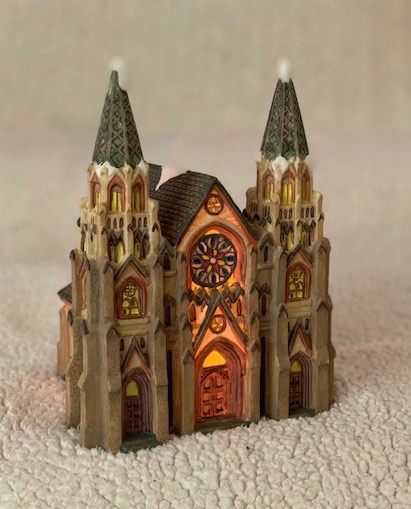Sunday we celebrated the resurrection of our Savior from the dead. Many significant events happened that day and in the days leading up to it nearly 2000 years ago. One of these which coincided with Christ’s death is described in Matthew 27:51a: “And behold, the curtain of the temple was torn in two, from top to bottom.” The tearing of that curtain which separated the Most Holy Place from the rest of the temple signaled a new beginning. No longer would men and women need to go through a priest for access to God. In Acts 2, we begin to learn more about the new plan, the church.
The church didn’t exist in the Old Testament. The tabernacle prescribed by God for the Jews of the Old Testament was not a church. Acts 2 relates the birth of the church, and Ephesians 2-3 explains it more fully. The Apostle Paul refers to the salvation now available to both the Jew and the Gentile and the joining together of the saved Jews and Gentiles in one body as a “mystery.” Read Ephesians 2:11 through 3:13. It’s called a mystery not because clever investigators are the only ones who can figure it out but because it was completely unknown to the Old Testament saints.
All the Old Testament saints knew was the Law, a system instituted for the Israelites which included commandments and ordinances and animal sacrifices. Christ’s death on the cross was the final sacrifice made to atone for sin. He was the bringer of peace, and his peace is now offered to all mankind, not only the Jews. The prophet Isaiah wrote, “How beautiful upon the mountains are the feet of him who brings good news, who publishes peace, who brings good news of happiness, who publishes salvation”(Isaiah 52:7). In Romans 10:15, Paul refers back to this prophecy in speaking of the peace the gospel brings: “As it is written, ‘How beautiful are the feet of those who preach the good news!’”
Paul explains this peace for all in Ephesians 2:13-18: “But now in Christ Jesus you who once were far off have been brought near by the blood of Christ. For he himself is our peace, who has made us both one and has broken down in his flesh the dividing wall of hostility by abolishing the law of commandments expressed in ordinances, that he might create in himself one new man in place of the two, so making peace, and might reconcile us both to God in one body through the cross, thereby killing the hostility. And he came and preached peace. . . . For through him we both have access in one Spirit to the Father.”
The Ephesians to whom Paul is writing are Gentiles, so when Paul tells them that they can be fellow citizens and members of the household of God with the Jews, he’s clarifying a huge blessing to all non-Jews. Notice, however, that Paul doesn’t state that the Gentiles are now fellow-citizens of Israel; he explains that saved Gentiles and saved Jews are now fellow-citizens of this new entity, the church. When Christ died as the final sacrifice and the temple curtain was torn from top to bottom, the OT system of Law for the Israelites ended. Now all who accept Christ as Savior have direct access to the Father, regardless of race or heritage.
When you accepted Christ as your Savior, you became a part of the church, the dwelling place for God, referred to figuratively as a building. Paul gives us more information about this mystery: “So then you are no longer strangers and aliens, but you are fellow citizens with the saints and members of the household of God, built on the foundation of the apostles and prophets, Christ Jesus himself being the cornerstone, in whom the whole structure, being joined together, grows into a holy temple in the Lord. In him you also are being built together into a dwelling place for God by the Spirit”(Ephesians 2:19-22).
Jesus Christ is the cornerstone, and the apostles and prophets are the foundation. Just as every stone in a literal building is important, every person in this organism called the church is also important. You function in this figurative building by functioning in a literal local church.
Over the past year, restrictions on public gatherings have affected churches. With fewer opportunities to serve or fellowship, we may begin to subconsciously waver in the priority we place on church. Perhaps you recently moved as you began your adult life away from home, and you’re considering not finding a church because you can worship God on a hike into the woods or in the quiet of a study lounge with your Bible in hand. While you’re correct in thinking that you can worship God anywhere, and while worshiping God in his creation and reading his Word are worthy activities, they have nothing to do with whether or not you should be part of a local church. The church is God’s plan for this age. Knowledge of your position in the church should create a sense of responsibility to fulfill your task. Remember Ephesians 2:8-10: “For by grace you have been saved through faith. And this is not your own doing; it is the gift of God, not a result of works, so that no one may boast. For we are his workmanship, created in Christ Jesus for good works, which God prepared beforehand, that we should walk in them.”
Also note Paul’s words in Ephesians 3:8-10a: “To me, though I am the very least of all the saints, this grace was given, to preach to the Gentiles the unsearchable riches of Christ, and to bring to light for everyone what is the plan of the mystery . . . so that through the church the manifold wisdom of God might now be made known.” He writes these words while imprisoned for preaching the gospel, but you won’t find any “woe-is-me” sentiment in these passages. He accepts all that happens to him as a privilege because of the opportunity it gives him to preach Christ, to communicate the gospel and God’s plan.
Our salvation is a gift from God, and we are God’s “workmanship, created in Christ Jesus for good works.” We should take advantage of the privilege of being part of a church so that we can be “built together into a dwelling place for God.”

